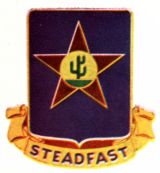- September 11,
2005
Reunion sparks memories
PHYLLIS J. ZORN
Hays Daily News
-
-
When they went to war over 60 years ago, they were many. Now they
are few, but
- once a year they come
together to remember.
The members of Company K, 409th Infantry
Regiment, 103rd Division held their
- 26th reunion this year in
Hays. Hays resident Jack Schramm, who was first lieutenant
- when K Company entered the
war and a captain at war's end, was the executive officer
- of K Company during World
War II. The company entered France and finished the
- war in Austria, under the
command of Gen. Alexander Patch.
The close bond forged between them during
the war is evident even 60 years after the
- end of the conflict. Sitting
down together for a photo, the men couldn't resist taking
- verbal pokes at each other.
"Schramm was in command when we went
across the Danube. We went across in the
- middle of the night,"
one of them said.
"I was lost. You guys just followed me
- that's what it was. I was trying to get away
- from you. I was more scared
of you than I was of the Germans," Schramm quipped.
Indeed, crossing the Danube in assault
boats that night was what Schramm had
- earlier noted as the most
memorable moment of the war.
The second most memorable moment for
Schramm was the day the company
- fought its first battle.
"To think someone was shooting at you
and you don't even know them,"
- Schramm said, shaking his
head.
Others agreed the first battle is what they
most often remember.
"On our first day of combat we got
pinned down on our bellies for a whole day
- in the mud, with one lousy
machine gun," said Washington, Kans., resident Robert
- "RR" Jones.
Jones noted that one soldier died in that
fight and was buried in France. Others
- were mortally wounded, Jones
remembered.
"The first day we went into battle -
it's traumatic. You don't know what might
- happen, but all of a sudden
you're there. The utter realization that you've got your
- life on the line," said
Jim Lightner, who came from Green Bay, Wis. for the reunion.
The left side of Lightner's jaw bears the
scar from a bullet that tore through it
- during a later battle.
Another man at the reunion, Joe Rushing, also survived being
- shot. Rushing was shot
through the chest, with the bullet entering his front and coming
- out his back. Rushing
declined to be interviewed.
Dwight Gunberg, who lives in Minneapolis,
Minn., said the company was made up
- of many enlisted men who'd
had different plans for their military stints. He himself was
- in training as an Air Force
cadet when the Pentagon changed its mind about his - and
- 35,000 others' - training.
With the approach of D-Day, infantrymen were urgently needed.
- To beef up the ranks of the
infantry, specialized military training programs were thinned
- out and soldiers redirected
for duty as infantry men.
"It was an unusual outfit in that here
you had these older guys and they were the
- cadre of the outfit and they
had all these younger guys who had inflated ideas of their
- intelligence, and they were
going to be the grunts," Gunberg said.
Gunberg remembers reporting to Camp Van
Doren, Miss., for six weeks training before
- the company was sent to
France.
"That was a hell hole, I tell
you," Gunberg said.
Many of the former soldiers recall their
leader with fondness, but Gunberg said that
- time has softened their
memories of Joe Bell.
"The captain, Joe Bell, is universally
canonized, but they forget," Gunberg said.
Bell drank too much and had a hot temper,
though he was a first-rate commander who
- made good strategic
decisions.
"We didn't love him. We respected
him," Gunberg said.
Gunberg remembers a night he was assigned
to guard a rope footbridge nearby where
- the soldiers were staying.
Gunberg put together a shelter for himself, to keep out of the rain,
- with shutters he took from
other houses. Two of his buddies went inside the little shelter
- and refused to come out so
Gunberg could have it back. Both died that night when the
- Germans attacked. Gunberg
remembers carrying one of them back across the rope bridge
- the next day.
"If those guys had gotten out of there
and let me in there, it would have been me that
- was carried out,"
Gunberg said.
Jones said he was issued an M-1 Rifle by
the Army and acquired a .45 caliber
- Thompson in a manner that he
won't discuss. But there is something else about his
- experience that Jones wants
to make sure people know.
"War is hell, and if we have good
politicians, we wouldn't get into any of them. I
- have no use for this asinine
antic that we're involved in in Iraq. But I respect the poor
- souls who are there with the
rifles kicking in the doors. I've been there," Jones said.
"We who weren't married were
fortunate, I think. I did not envy the guys who were
- married - because they had a
wife back home and we didn't. It made life easier, I'm sure.
- I remember during a fire
fight the guys who were laying on the ground all had rings on
- their fingers. That sort of
shook you - somebody back home had lost something,"
- Lightner said.
"After 60 years, you think, 'Well,
what if? What if they had lived? What would it
- have been?' It wasn't our
choice," Gunberg said.
Gunberg pointed out that every soldier who
died was important to their families and
- friends. Each loss was
something more than just one life.
"Anything we have is very dearly
bought. Very dearly bought by a lot of people -
- it didn't come by
accident," Gunberg said.
As for Lightner, the lasting lesson of the
war was that faith matters no matter what
- situation a person is in.
"So many call for deliverance at that
point when they're in trouble and yet they forget
- it when life becomes
easy," Lightner said.
Reporter Phyllis Zorn can be reached at (785) 628-1081, ext. 137,

